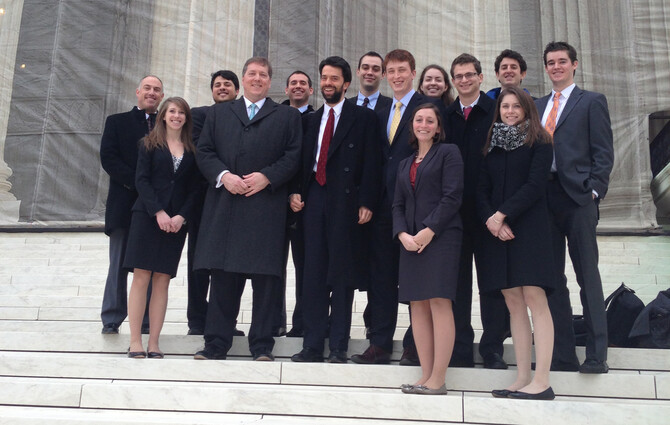SCOTUS considering a case brought by Penn Law’s Supreme Court Clinic
The legal argument the students helped to formulate maintained that the constitutional right to be free of retroactive (ex post facto) laws was violated when their client was sentenced to 70 months in prison in a check-kiting scheme. They will learn by the end of the Term in June whether the Justices agree.
Penn Law’s Supreme Court Clinic, which enrolls a dozen students, is now in its fourth full year of operation. Directed by Prof. Stephanos Bibas, it provides students a rare opportunity to hone their research and writing skills while gaining firsthand experience of what practice is like at the pinnacle of the legal profession.
“The students are always very excited to work on these cases,” Bibas said. “Very few lawyers ever get to do this. In law school, students get this tremendous window into practice.”
Students, who must be good writers to be accepted into the Clinic, move “from good to great” over the course of the year, he added. “They are not working on a mock memo. There’s a real client, and real lawyers are involved in rewriting the brief multiple times, until students see what a polished, final work-product looks like. All students in the Clinic end up having written real work-product that gets revised and then goes to the Justices.”
In addition to researching and helping draft the brief, the students participate in moot court rehearsals conducted days before the oral arguments at the Supreme Court. Students enrolled in the Clinic also participate in a semester-long seminar on Supreme Court Practice and Process.
“Being in the Supreme Court Clinic is absolutely the best of all worlds in law school,” said Danielle Acker Susanj, a third-year student who worked on the brief in the sentencing guidelines case. “There’s no feeling like spending hours digging into a question, then seeing your research and even your words fit into a brief that gets filed at the Supreme Court and read by Supreme Court Justices, and hearing that research brought up at oral argument, either by a Justice or by the professor arguing the case.”
This year the Clinic has handled three cases. Chafin v. Chafin, a case argued in December, involved international custody law. In January, Clinic faculty member James Feldman argued Levin v. U.S., a medical malpractice case involving a Navy doctor and the issue of sovereign immunity under the Federal Tort Claims Act. The Clinic was on the winning side in both cases, which were decided unanimously, with one more decision pending.
Bibas, a former law clerk to Justice Anthony Kennedy and a former federal prosecutor, established the Clinic in 2009 in partnership with the Paul Hastings law firm in Washington, D.C., where Stephen B. Kinnaird, also a former Kennedy clerk, heads the firm’s Supreme Court and appellate litigation practice.
Click here to view the full release.








